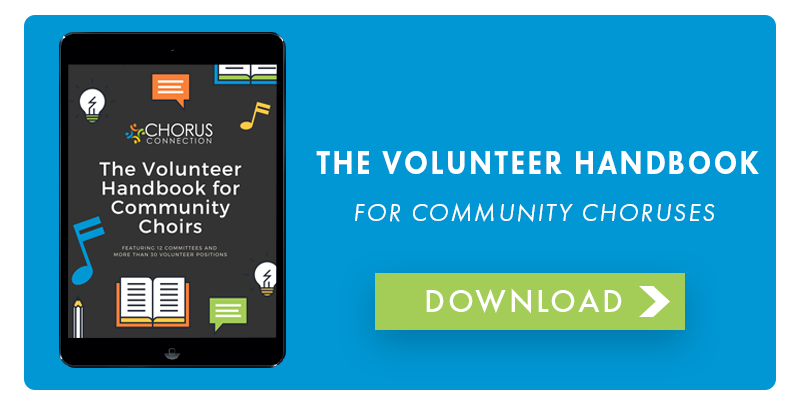
If you – like me – are a member of a choir with choristers from all walks of life, then you know just how wonderful it is to make music with people who have come to rehearsal with a completely different story than you. Choir becomes the thread that connects each person that walks in the door, regardless of everything else.
That variety, and that difference, is an asset – not just in our growth as individuals and as an ensemble, but also in how we consider the administration of our choirs. In my last blog on volunteerism, two of my strategies for engaging singers included building in different levels of volunteer work and encouraging volunteering from the very beginning. To expound on those two ideas, you also have to evaluate this huge question: who are your singers?
To give you an example, let’s take a chorister named Susan, who has been singing with the altos for five years. Knowing that Susan has expertise in data entry from her day job seems like enough to formulate an ask when looking for help managing your attendance. However, what might be less known is that while Susan has the relevant experience to assist on this task, she is also a mother of two, her husband is currently impacted by the government shutdown, and her father’s health is failing two states away. She comes to choir because she needs choir. Choir is an escape for her from everything else, and choir cannot become another burden.
We might need Susan’s help in this example, but Susan needs our help more.
Ultimately we cannot know everything about our singers, as we need to respect each other’s privacy at every possible turn. However, a well-formulated ask goes through the steps to ensure that people like Susan aren’t burdened unnecessarily by leadership not doing their due diligence.
We certainly don’t learn who our singers are solely for the purpose of volunteer asks. That should already be something that is inherent in your ensemble for so many other reasons, the simplest being basic decency. But it is true that singers that see that level of respect going into volunteer efforts are far more likely to step up to the plate when they have the capability to do so.
People find time to volunteer at different times in their lives. At the last board meeting for The Capitol Hill Chorale, one of our new community board members inquired how it was we came to be on the board and how we found the energy to be so committed to the ensemble. It was a question that a lot of us had never really answered before, although we’d all considered it at one time or another. The answers varied: some of our board members are younger and find incredible value in the professional aspects of a working board that they don’t necessarily get in their current jobs; some have been in the Chorale for decades and want to ensure we continue to strive for greatness; some are finding themselves with more free time on their hands now that children are grown, and they want to find a way to give back to the Chorale. All of us, however, stated a love for the Chorale, its people, and its mission, as the core of our efforts. If we didn’t care for each other and our work, there wouldn’t be such a driving force behind our volunteerism.
From our earlier example, Susan might not be able to volunteer for the next five years. After her father passes, and her children go off to college, perhaps she might turn her attention to her choir, particularly if her choir had given her support. That support could range from the altos arranging to babysit for her kids while she and her husband go to care for her father, or the choir raising funds for those affected by the government shutdown (which here in DC was a genuine catastrophe), or simply giving her a safe space to sing and be welcomed once a week.
Yes, there are strategies to recruiting volunteers. But at the heart of a successful organization are people who feel like they are a part of it.
If you show up for your singers, they will show up for you.

Jennie Weyman is the Managing Director of the Friday Morning Music Club in Washington, D.C. She is also an active member of both the Capitol Hill Chorale, serving on the Board of Directors since 2015, and the Washington Revels. She has previously worked with both The Washington Chorus and Arena Stage at the Mead Center for American Theater. Jennie taught elementary music for two years, and continues to teach musical theater workshops in her spare time. When not working, Jennie freelances as a graphic designer, reads terrible mystery novels, and makes Airbnb wishlists. Go Hufflepuff!

